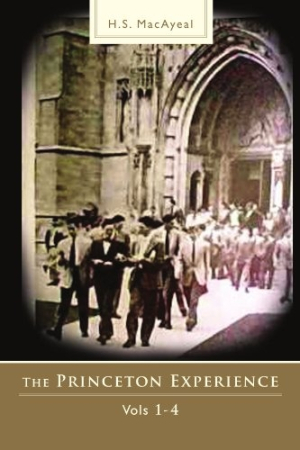The Princeton Experience
Vols. 1-4
Few people ever get a firsthand look inside the storied halls of Princeton University, but The Princeton Experience Vols. 1-4 offers a glimpse into the life of a “Princeton man” between 1948 and 1952.
H.S. MacAyeal vividly recreates those years through characters bearing colorful, Princetonian names like Aunt Boo, Gouch, Skokie, and Bud (later rechristened “Poo”). The “memoirist” and main character, Harry Douglas, is the guiding voice of the narrative as he and his friends sell hot dogs, become Communists (to get girls), work as census takers (and, incidentally, meet Albert Einstein), all while completing rigorous academic demands.
The Princeton Experience endears itself with moments of teenage angst, young adult soul-searching, romantic fumblings, and humor, including a trip “out West,” during which the young men mistake a prison for an apartment building while selling magazines.
The word “phony” crops up in reference to Aristotle, and it brings to mind The Catcher in the Rye. Of course, this is Princeton, so the “phony” is quickly retracted by Harry, in favor of more expansive ruminations. It’s as if Holden Caulfield had gone to college.
Harry finds love for the first time as the Korean War beckons, and, as an aspiring writer he struggles to find his place in the world: “I just feel that my life must be lived with broader horizons. What could be more terrible than to think all day of finance, and have art as a hobby?”
Conflicted about attending Princeton from the start, Harry listens as a classmate considering Yale Law School summarizes the ennui that comes with the high expectations of their families: “Yale is … just like Princeton. It is full of nice, meaningless, non-existing boys. If I’d gone up here [Yale] first, he said, I’d be at Princeton’s non-existent Law School right now.”
The words and phrasing all ring true, but with no biographical information about the author and a protagonist named Harry Douglas instead of H.S. MacAyeal; one is left to wonder whether The Princeton Experience is a memoir, a novel, or some combination of the two. Was The Princeton Experience written in the 1950s and only recently published, or is the book the admirably detailed recollection of an octogenarian? An explanatory note from the author would have been helpful.
The author’s decision to omit some standard punctuation works most of the time, but there are instances where typos or unusual choices prove distracting. Still, The Princeton Experience is a heartfelt, appealing story. It is strongly recommended to any reader curious to peek inside the mind of a “Princeton man.”
Reviewed by
Peter Dabbene
Disclosure: This article is not an endorsement, but a review. The publisher of this book provided free copies of the book and paid a small fee to have their book reviewed by a professional reviewer. Foreword Reviews and Clarion Reviews make no guarantee that the publisher will receive a positive review. Foreword Magazine, Inc. is disclosing this in accordance with the Federal Trade Commission’s 16 CFR, Part 255.

